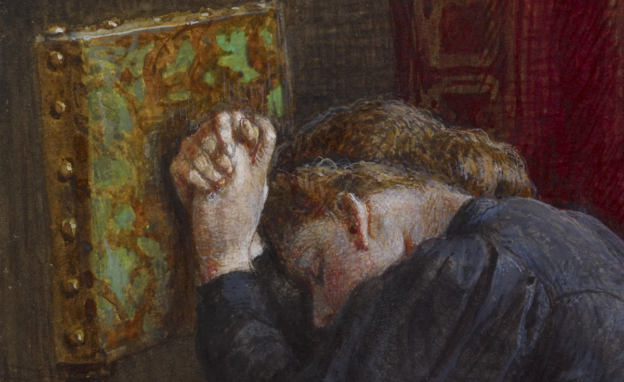Sometimes life is not fair. You have many things that people think should make you happy, but not the one thing you desire. The harsh words bear down on you, but the support you receive is not comfort. Where do you turn? Only God can provide comfort, and God shows us that he is the one who brings comfort and healing for the hurt.
The Book of 1 Samuel begins with an account of Samuel’s birth. The nature of the tale makes it clear that God is going to act in a special way through Samuel, to right the wrongs of Israel as they descended into barbarism in the time of the Judges. That story begins in God’s goodness to a godly but infertile woman, Hannah.
Hannah was the wife of Elkanah, a “certain man” from a township of Ephraim’s lands (v.1). Elkanah was a man of note and substance. We know this because his lineage is spelt out (v.1), and because he was able to afford two wives (v.2).
Two wives was not normal, but sometimes a social necessity. In Elkanah’s station, having heirs to inherit his status and fortune was important. Unfortunately, Hannah had no children (v.2), because God had closed her womb (v.5).
This was a socially disastrous situation, leaving aside the terrible sadness that comes with infertility. It was associated with God’s curse for covenant unfaithfulness (Deut. 28) and so assumed that those without children were under God’s curse. Further, as we see with Ruth, a lack of children to provide for you later in life was disastrous in those days. So Elkanah married another woman, Peninnah, who bore him children (v.2).
As with Jacob’s example with Rachel and Leah, it seems this caused considerable family turmoil. Elkanah loved Hannah, probably more than Peninnah. Yet Peninnah was the one who bore children, not Hannah. Each wife had what the other wanted.
Elkanah was a godly man, and Hannah a godly woman. Each year the family would go to the tabernacle which was located at Shiloh to worship God (v.3). In the days of the Judges, this set them apart. Even as we shall see the rot was firmly set in the family of Eli the High Priest.
Elkanah’s love for Hannah is shown in his providing a double portion of the thank offering sacrifices to Hannah, while Peninnah and kids received a single portion (v.5). Peninnah’s jealousy for Hannah’s belovedness led to goading about her childlessness, year after year (vv.6-7). Standing in the presence of God was not enough to birth compassion in Peninnah’s heart. It was all too much to bear.
Not even Elkanah’s hamfisted attempt at comfort, suggesting she did not need kids because she had him, healed the hurt (v.8). (Not that I am a Love Doctor or a great husband, but perhaps if he suggested that he loved her more than ten sons, it might have been more comforting?)
The sadness sent Hannah to the only place of comfort – to God. Hannah’s sobbing prayers in the temple led her to vow to dedicate her child to God, if only he would give her one (vv.9-11).
Eli, the High Priest, who let his sons get away with murder, still seemed to dislike misbehaviour in the sanctuary, and misinterpreted Hannah’s anguish for drunkenness (vv.12-14).
But his rebuke was met with the soft words of a heart “pouring out [her] soul before the LORD” (v.15), bringing her “anxiety and vexation” to God (v.16).
Eli’s accusation instead turned to blessing, as he encouraged her to go in peace and prayed that God would answer her request (v.17). Hannah went away comforted, her face no longer sad (v.18).
The next day, the family worshipped then returned home (v.19). Elkanah and Hannah were intimate, and God remembered Hannah (v.19, cf. v.11). A boy named Samuel was born, because God heard Hannah (v.20).
Where do we go when we suffer hurt? Where do we encourage others to go when they suffer pain? The only place of true comfort is the one Hannah sought. Pouring out our anxieties and sadness to God. God is able to hear and to bear our pain in a way none of us, certainly no bumbling husbands(!), are able.
The sadness and misfortune of others is not an opportunity to hurt them more, as Peninnah did, even if it is to cover up for our own hurt. Such behaviour is not consistent with a heart that seeks God. Instead, it is an opportunity for us to encourage them to pour their burdens on Christ, the refuge of the weary soul.
We do not know the reasons for the pain we go through. How it might shape us, or perhaps if it may be made whole in this life or the next. But God is the one who brings comfort for the hurt, as he did with Hannah, so he might do wonders in Israel, and point them to their true and coming king, Jesus Christ.


